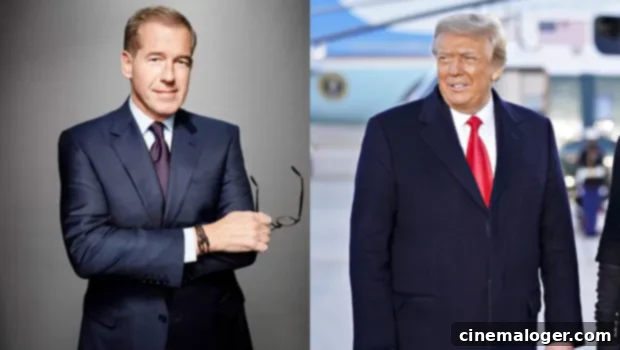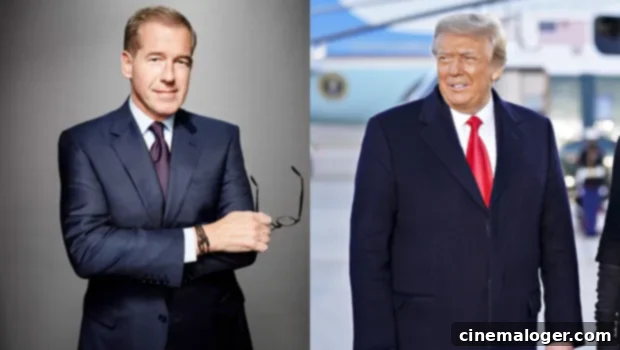Brian Williams’ ‘Jerry Maguire’ Troll: A Masterclass in Political Satire Targeting Trump and McCarthy’s Mar-a-Lago Meeting on MSNBC
In the dynamic world of political commentary, where news anchors often walk a tightrope between reporting facts and offering analysis, some moments transcend the typical broadcast to become iconic examples of satirical brilliance. One such instance unfolded on MSNBC’s The 11th Hour, where veteran anchor Brian Williams delivered a segment that perfectly blended sharp political observation with unexpected humor. Williams, known for his incisive critiques of the previous administration, orchestrated a memorable prank that cleverly mocked a high-profile meeting between former President Donald Trump and House Minority Leader Kevin McCarthy (R-CA) at Trump’s Mar-a-Lago residence.
The segment quickly went viral, cementing its place as a classic piece of broadcast satire. Williams, with his signature deadpan delivery, promised his viewers exclusive, never-before-seen footage from the highly anticipated meeting. The build-up was palpable, leading many to believe that MSNBC had somehow secured a genuine glimpse into the private discussions between the two Republican figures. However, what followed was a stroke of comedic genius that caught both his on-air guests and the audience completely off guard, demonstrating Williams’ unique ability to use humor as a potent tool for political commentary.
Instead of a clandestine recording of political strategizing, viewers were treated to an unexpected, yet perfectly timed, clip from the beloved 1996 romantic dramedy Jerry Maguire. Specifically, it was the film’s quintessential, emotionally charged scene where Jerry Maguire, played by Tom Cruise, makes a heartfelt, dramatic plea to Dorothy Boyd, portrayed by Renee Zellweger, delivering the now-iconic lines: “You complete me.” Her equally famous, teary-eyed response? “You had me at hello.” The juxtaposition of this intensely romantic, almost overly saccharine moment with the dry political context of a Trump-McCarthy meeting was not just humorous; it was a pointed and eloquent commentary on the nature of their alliance.
The implications of Williams’ prank were immediately clear. The former president’s Save America political action committee (PAC) had released a statement on Thursday, prior to the airing of The 11th Hour, detailing the supposed nature of the Mar-a-Lago encounter. According to the PAC, Trump had graciously pledged his support to McCarthy and the broader Republican Party, aiming to regain control of the House of Representatives in the upcoming 2022 midterm elections. The press release described the meeting as “very good and cordial,” emphasizing a renewed sense of unity and shared purpose between the two powerful figures. Williams’ choice of the Jerry Maguire clip, however, subtly, yet powerfully, suggested a different narrative. It implied that the meeting was less about strategic political alignment and more about a desperate, almost fawning reconciliation, with McCarthy needing Trump’s affirmation and Trump basking in the attention and loyalty.
The “you had me at hello” scene, laden with declarations of mutual dependence and emotional completion, served as a brilliant metaphor for what Williams perceived as the underlying dynamic between Trump and McCarthy. It highlighted the idea that McCarthy, who had initially criticized Trump after the January 6th Capitol riot, was now returning to the fold, seeking Trump’s blessing and influence. This return, Williams suggested, was not just a pragmatic political move but almost an act of profound, if politically motivated, devotion. The clip transformed what was presented as a high-stakes political summit into a parody of exaggerated affection and loyalty, laying bare the perceived theatricality of their reunion.
Someone PLEASE TELL ME what happened tonight on @11thHour with Brian Williams! 🤣 pic.twitter.com/VjzwMPbtt2
— Douglass Sloan (@DougSloan) January 29, 2021
The immediate aftermath of the “mistake” was as entertaining as the prank itself. After the clip concluded, a perfectly straight-faced Williams deadpanned, “Obviously we have rolled the wrong clip. I thought this was going to be of the McCarthy and Trump meeting and someone’s gonna be, of course, in big trouble.” This feigned embarrassment only heightened the humor, making it clear that the “error” was entirely intentional and designed for maximum comedic impact. His guests, conservative commentator Bill Kristol and comedian Baratunde Thurston, were visibly struggling to contain their laughter. Their uncontrollable giggles underscored the segment’s effectiveness; it was a moment of genuine, spontaneous amusement rarely seen in serious political broadcasts. Thurston, in particular, found it challenging to collect himself, admitting he was “still recovering” from the sheer absurdity and brilliance of the clip. He humorously chastised Williams, saying, “I’m mad at you right now for making me break so much,” highlighting the infectious nature of the joke and Williams’ successful delivery.
This incident wasn’t an isolated event but rather another chapter in Brian Williams’ long-standing and often sharp criticism of Donald Trump. Throughout Trump’s presidency, Williams consistently used his platform on The 11th Hour to provide pointed commentary, often beginning each episode by meticulously counting down the days Trump had been in office and the days remaining until the 2020 election. This relentless, almost methodical approach positioned Williams as one of Trump’s most consistent and articulate critics in mainstream media. His coverage wasn’t just about reporting the news; it was about framing it within a broader political context, often highlighting the perceived inconsistencies and controversies of the Trump administration.
The animosity between Williams and Trump was a two-way street. Trump, never one to shy away from lashing out at his media detractors, publicly attacked Williams on multiple occasions. In April 2020, Trump took to Twitter to call Williams “dumb as hell” and further asserted that Williams “wouldn’t know the truth if it was nailed to his wooden forehead.” These personal insults were typically fueled by Williams’ critiques of Trump’s policies and actions, most notably his handling of the COVID-19 pandemic. Williams’ consistent questioning of the administration’s response to the global health crisis made him a frequent target for the former president’s ire, underscoring the intense, often personal, nature of political discourse during that era.

The brilliance of Williams’ Jerry Maguire stunt lies in its effective use of satire as a form of political commentary. In an age dominated by soundbites and polarized media landscapes, humor can often cut through the noise more effectively than direct criticism. By portraying the Trump-McCarthy meeting through the lens of a cheesy romantic comedy, Williams managed to strip away the seriousness of the official narrative and expose what he and many others perceived as a transactional, perhaps even undignified, display of political expediency. It was a moment that transcended mere news reporting, transforming into a cultural touchstone that resonated deeply with viewers who found humor in the often-absurd world of politics.
Political satire serves multiple vital functions in a democratic society. Firstly, it offers a pressure release valve, allowing audiences to process complex or frustrating political situations through laughter. Secondly, and perhaps more importantly, it can highlight hypocrisy, expose underlying motives, and question official narratives in a way that direct journalistic critique sometimes struggles to achieve. Williams’ “exclusive video” segment was a perfect illustration of this power. It didn’t just report on the Trump-McCarthy meeting; it offered a biting interpretation of its underlying dynamic, forcing viewers to consider the optics and implications beyond the bland official statement.
The segment’s widespread appeal also speaks to the enduring power of popular culture references in political discourse. The “you had me at hello” line is instantly recognizable to millions, and its application to a political context created a moment of shared understanding and collective amusement. This cultural shorthand allowed Williams to communicate a complex message about political allegiances and power dynamics without uttering a single overtly critical word during the prank itself. The humor was embedded in the unexpected juxtaposition, leaving the audience to connect the dots and appreciate the subtle yet profound critique.
Moreover, the reaction from guests Bill Kristol and Baratunde Thurston further amplified the segment’s impact. Their genuine, unscripted laughter and struggle to regain composure reinforced the idea that the humor was universal and deeply effective. It wasn’t just a scripted bit; it felt like a spontaneous moment of shared comedic relief, inviting viewers to laugh along with them. This kind of authentic reaction is invaluable in television, creating a more engaging and memorable experience for the audience, and solidifying the moment as more than just another news segment.
In conclusion, Brian Williams’ ‘Jerry Maguire’ troll on The 11th Hour was far more than a simple comedic interlude. It was a meticulously crafted piece of political satire that brilliantly used popular culture to critique the complex and often theatrical dynamics of power. By playing on viewer expectations and subverting the traditional news format, Williams delivered a memorable statement about the relationship between Donald Trump and Kevin McCarthy. This segment stands as a testament to the power of humor and sharp wit in political journalism, proving that sometimes, the most insightful commentary doesn’t come from a direct attack, but from a perfectly timed, unexpected movie clip. It continues to be cited as an example of how news anchors can creatively engage with, and critically comment on, the political landscape, leaving a lasting impression on the audience and contributing significantly to the broader discourse surrounding the figures involved.
